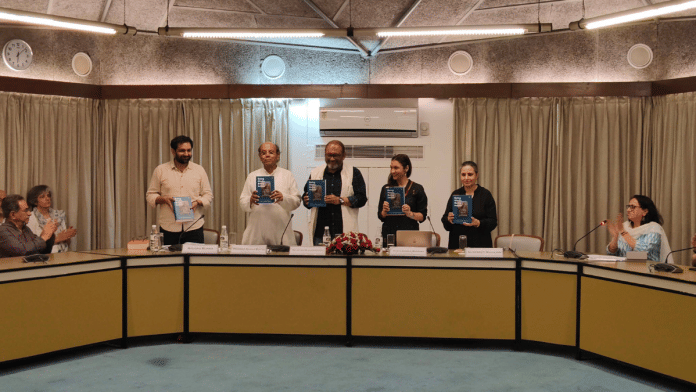New Delhi: A freedom fighter, devout Hindu, revolutionary, and ‘Punjab Kesari’ — these were the many hats donned by Lala Lajpat Rai. History books often describe him as a Right-wing Hindu nationalist who vigorously fought for ‘Hindu supremacy and majoritarianism’, putting him on the same pedestal as VD Savarkar. But, according to his great-granddaughter, Rai is misunderstood when he is regarded as more ‘Hindutvawadi’ than a truly secular nationalist.
“There is so much misinformation about Lala ji. Most of the people haven’t read his work and therefore don’t know he was a great orator and big proponent of democratic rights for all religions,” Anita Goyal told ThePrint.
On a recent evening at New Delhi’s India International Centre, an unusual crowd gathered when author and academician Vanya Vaidehi Bharghav’s book Being Hindu Being Indian was put to discussion. Historians, history enthusiasts, students as well people with political backgrounds and from the film fraternity came together to discuss Lala Lajpat Rai’s idea of nationalism and Hindutva politics.
Goyal, who was present at the discussion, praised the book, saying she looks forward to more such work that paints an unbiased picture of her great-grandfather.
Much of the public debate today in India centres around ideas of Hindutva and nationalism. And for many, the narrative is singularly anti-Muslim—all Hindutva leaders are painted in the likeness of Savarkar.
But that wasn’t the case with Rai.
The misunderstood Hindutva leader
Bhargav opened the discussion by firmly pointing out that Savarkar and Rai weren’t the same.
“Lajpat Rai’s nationalism has to be recognised as different from Savarkar’s. Savarkar demanded that minorities renounce their culture and adopt ‘Hindu culture’, which he equated with India’s culture. Rai rarely made this equation, did not desire Hindu cultural uniformity or dominance. He instead respected India’s religio-cultural diversity,” she said.
The discussion, which lasted a little more than an hour, saw the participation of historian Pradeep Kumar Datta, former JNU professor Gurpreet Mahajan, and IIT Delhi assistant professor Arudra Burra.
Lajpat Rai was a staunch believer in swarajya or self-rule. His nationalism was characterised by unwavering commitment to the ideals of freedom, justice, and equality.
Early on in life, he was actively involved with the Arya Samaj and lent his voice to the cause of ‘protecting’ Hindu rights. In doing so, he was considered a sympathiser, or more appropriately, a believer of the Savarkarite school of thought on Hindutva.
Being contemporaries, Rai and Savarkar shared similar fears about ‘Muslim domination’ in India, but unlike Savarkar, Rai was never in favour of extremism and according special status to Hindus with an absolute majority. Instead, he was an ardent believer in secularism.
Mahajan said that Rai’s Hindutva politics wasn’t influenced by religion — he didn’t believe in Hindu supremacy.
“As a Hindu Mahasabha leader, Rai rejected Hindu theocracy and even a state with Hinduism as the privileged religion. Instead, he imagined a secular state that largely maintained strict separation from all religions, guaranteeing all communities full religious freedom,” Bhargav said. The academician also mentioned that Rai acknowledged minorities’ concerns of Hindu domination — and so he considered reservation for them too. In one instance, he even advocated for Hindustani (a mix of Persian-Arabic and Sanskrit) as India’s national language.
Although Rai spoke about protecting Hindu rights, he opposed any dreams of a Hindu Raj, calling it “insanity that would ruin Hinduism as well as India”, the author said.
Support to the Khilafat Movement
Born in the aftermath of World War I and the collapse of the Ottoman Empire, the Khilafat Movement aimed to protect the interests of the Muslim world, particularly the Ottoman Caliphate, which was under threat of dismantlement by the victorious Allied powers. Sensing an opportunity to forge a united front against British imperialism, Indian nationalist leaders, including MK Gandhi, Mohammad Ali Jauhar, and Maulana Shaukat Ali, rallied behind the Khilafat cause.
Rai, too, joined in, demonstrating his commitment to Hindu-Muslim unity in the fight against British imperialism. He saw the movement as an opportunity to forge a united front against British colonial rule, emphasising the common goal of freedom for all Indians, regardless of their religious background.
“During the Khilafat movement, he argued that any question affecting India’s Muslims was a national question for India’s Hindus; and that an offence to India’s Muslims was an offence to its Hindus. Hindus have a duty to support Muslim religious sentiments,” added Bhargav.
The author went on to say that Rai actually viewed the medieval period in India not as a time of foreign invasion but as a period of cultural exchange.
About parallels between the early 20th century and today’s political climate, Bhargav told ThePrint that the only constant thing has been the fear and insecurity of Muslim domination. Today, she said, political leaders lean more toward the Savarkarite school of thought. Rai is cited mostly when Muslim domination is talked about. And Bhargav gave a context for Rai’s fears.
“Many of Rai’s fears stemmed from his Hindu minority position in Muslim-majority Punjab. The all-India context in independent India is different, where Hindus form the majority and are over-represented in all of India’s powerful institutions.”
What is often ignored is Rai’s rejection of the state’s support for any one religion, his belief in equal citizenship, and his rejection of ideas of homogeneity and domination as unethical and undesirable, she added.
(Edited by Humra Laeeq)







Did Lalaji has written any piece of note where he disagree with Savarkar. What is said about 96 years of his death has no relevance. Maybe the person who has written this article must have some motive to defame BJP and Savarkar. Why now. The timimg is important. The Congress has saturated to its lowest ever. So, any wiseman could not digest this anti hindu rhetoric.
And once again if that is so, If people of pakistan abd bangladesh are happy to be ruined by being a citizen of Islamic country. We hindus will be happy if we get ruined for being a Hindu Nation.